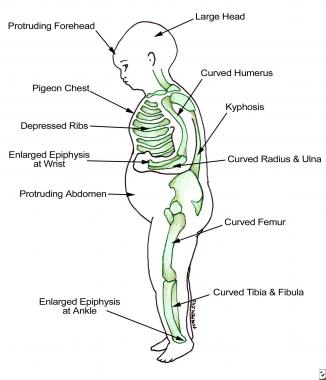
noun Pathology.
- a disease of childhood, characterized by softening of the bones as a result of inadequate intake of vitamin D and insufficient exposure to sunlight, also associated with impaired calcium and phosphorus metabolism.
noun
- (functioning as singular or plural) pathol a disease mainly of children, characterized by softening of developing bone, and hence bow legs, malnutrition, and enlargement of the liver and spleen, caused by a deficiency of vitamin D
disease caused by vitamin D deficiency, 1630s, of uncertain origin. Originally a local name for the disease in Dorset and Somerset, England. Some derive it from a Dorset word, rucket “to breathe with difficulty,” but the sense connection is difficult. The Modern Latin name for the disease, rachitis, comes from Greek rhakhis “spine” (see rachitic), but this was chosen by English physician Daniel Whistler (1619-1684) for resemblance to rickets.
n.
- A bone disease resulting in defective skeletal growth in children, analogous to osteomalacia in adults, characterized by bone demineralization caused by deficiency or impaired metabolism of vitamin D or phosphates. infantile osteomalacia juvenile osteomalacia rachitis
- A bone disease seen mostly in children, caused by a deficiency of vitamin D, usually as a result of inadequate dietary intake or lack of exposure to sunlight. This deficiency causes decreased calcium absorption from the intestine and abnormalities in formation and mineralization of skeletal bone, resulting in defective bone growth and deformity.
 Liberal Dictionary English Dictionary
Liberal Dictionary English Dictionary